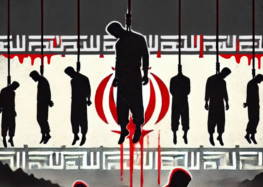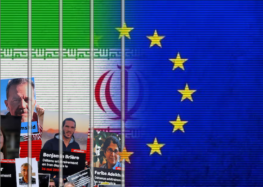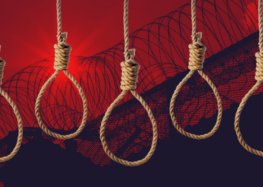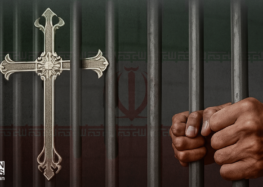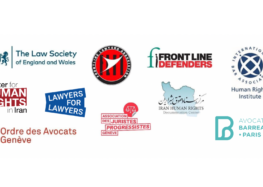Sharq Newspaper Banned, Manager Imprisoned, Cartoonist Summoned
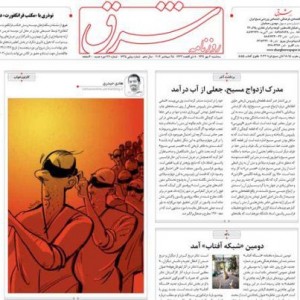
The cartoon that led to a ban on Sharq Newspaper today. The cartoonist, Hadi Heydari, was also summoned to court for it.
Following publication of a cartoon entitled “The Blindfolded Men,” Sharq Newspaper was banned on September 26. In a concerted effort by 150 Members of the Parliament, state authorities, and clerics, the newspaper was banned a day after the cartoon was published and the cartoonist, Hadi Heydari, was summoned to court. Mehdi Rahmanian, the newspapers manager and license holder, was transferred to Evin Prison.
Those protesting the cartoon state that it is an insult on Iran-Iraq War veterans, but many believe this to be a mere excuse for banning the reformist newspaper.
Related links:
– Fars News Agency, Rahmanian: I’m on my way to Evin Prison (Link in Farsi )
– Fars News Agency, Sharq Newspaper cartoonist was summoned to court (Link in Farsi)
– Mehr News Agency, Rahmanian awaits shift judge with bail
The cartoon shows a line of blindfolded individuals who are each engaged in tightening the blindfolds of the man in front of them. Publication of the cartoon during the week long annual commemoration of the Iran-Iraq War’s “Holy Defense Week” has been used by critics as indication that Heydari has used an image of soldiers walking in a line, sporting blindfolds instead of the headbands the Iranian soldiers used to wear during the 8-year-long War.
In an article entitled “Explanation of a sketch,” Hadi Heydari, an accomplished cartoonist who has worked for reformist publications for several years, said a day after the cartoon was published, “Those who know my and my family’s past, are aware of my deep devotion to the brave War veterans. Under no circumstances would I be willing to insult such great men to whom all of us are indebted for their sacrifices.”
“This sketch intends to display ‘ignorance,’ where some, in broad daylight, are blindfolding each other, to keep them from seeing the daylight. If the cartoonist wished to show soldiers, they would have to be wearing war uniforms, carrying arms, and be shown in a war setting,” ISNA News Agency quoted Hadi Heydari.
“I served in the War for 18 months. We have written about the Holy Defense several times at Sharq. We would never allow anyone to insult the War veterans, because I would be included in the insult myself,” Mehdi Rahmanian, the license holder for the now banned Sharq Newspaper responded to the critics.
At today’s cabinet meeting, Iran’s Minister of Culture and Islamic Guidance told the reporters that the cartoon’s objective matched that of the foreign media, and stated that the newspaper must be banned. “The widespread distribution of this cartoon in foreign media displayed coordination in this area and we regret that this was done by a domestic publication. As soon as we determined the violation, we issued a written warning to the newspaper. We wish to ban this newspaper,” said the Minister of Culture and Islamic Guidance.
Hojat-ol-Islam Seyed Ali Taheri, a Principalist MP told Fars News Agency that the cartoonist must receive maximum punishment. “Those who have insulted the Holy Defense, whether a newspaper or a cartoonist, must receive maximum punishment,” he added.
Even so, in an interview with UK-based reporter Massih Alinejad, the MP admitted that he had not seen the cartoon himself, but that based on what he had heard, the cartoonist must receive the maximum penalty. (You can listen to the Farsi audio file here)
During its nine-year long life, Sharq Newspaper has been banned three times. After its last two-year ban, the newspaper resumed publication in Spring 2010. Sharq Newspaper employed 65 staff members in its editorial, administrative, and technical departments.

